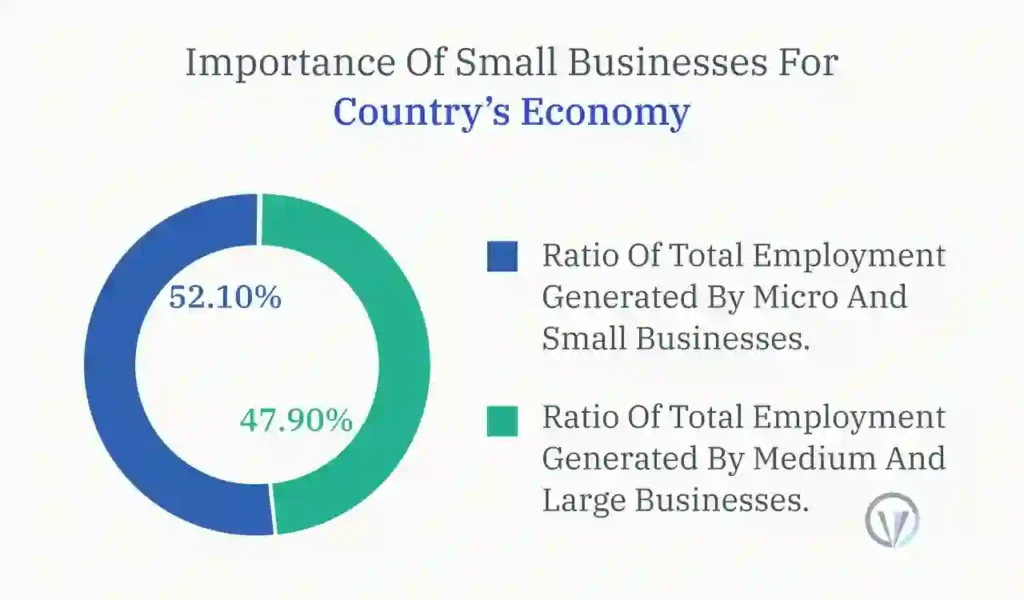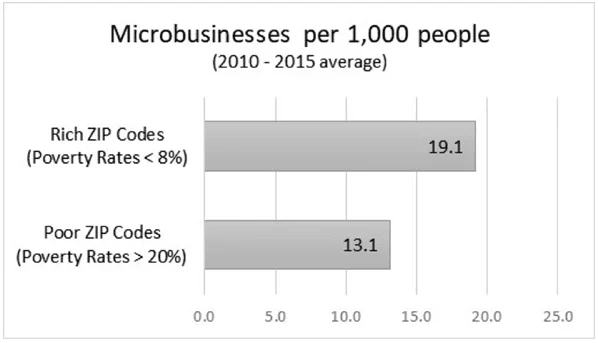Small businesses help the economy in ways that are as varied as the businesses themselves. They’re the corner stores, the tech startups, and the local services that form the backbone of our Economy.
In the U.S., small businesses contribute a whopping 65% of all new jobs and more than half of the nation’s GDP. Their impact is profound and far-reaching, touching every aspect of our economic life.
Unemployment, on the other hand, is a complex issue that affects not just individuals but the entire economy.
When people are out of work, they spend less, which can lead to a decrease in overall economic activity. This reduced spending power can ripple through the economy, affecting everyone from the local grocer to the national government.
It’s a cycle that affects everyone, from the individual to the nation.
But here’s where small businesses come into play. They have this incredible ability to help reduce unemployment.
How?
By being agile and quick to adapt, they can tap into local markets and create jobs that big businesses might overlook.
They work together with schools and colleges to make sure that people have the necessary skills for the job market. This helps to create a workforce that is prepared for the challenges of today. Additionally, they promote entrepreneurship, which leads to the creation of new jobs and motivates others to start their own businesses.
Related Article: I want to Start a Business, but Have no Ideas: Do it in 8 Easy Steps
How Small Businesses Help The Economy
Table of Contents
1. The Power of Small Businesses
Small businesses are not just the cornerstone of local communities; they are pivotal in driving the economy forward. Their economic impact is substantial, with small enterprises accounting for nearly half of all economic activity in the U.S. annually. This is a testament to their role in GDP contribution, showing their significant impact on GDP.
1.1 Small Business Economic Impact
The power of small businesses extends beyond mere numbers; it’s about the stories of growth and resilience that inspire economic development.
Take, for example, the case of a small tech startup that began in a garage and grew to become a market leader, contributing significantly to local job creation and entrepreneurship.

These stories are not rare; they illustrate the economic impact of small businesses.
Local business job creation is another area where small businesses excel.
They are responsible for creating two-thirds of all new jobs in the U.S., highlighting their critical role in employment and economic stability.
This job creation is not just about numbers; it’s about providing opportunities for communities to thrive and grow.
Entrepreneurship and economic growth go hand in hand, with small businesses often being at the forefront of innovation. They are agile, can quickly adapt to market changes, and are more likely to introduce new products or services, driving economic growth and development.
Lastly, the microbusiness contribution to GDP cannot be overlooked. These smallest of small businesses add a unique value to the economy, often filling niches that larger businesses cannot.
They too are essential players in the economic landscape, contributing to diversity and resilience in the market.
1.2 Local Business Job Creation
Small businesses, not large corporations, are the real job creators. Despite their size, small businesses are responsible for creating the majority of new jobs in the U.S. They are the ones driving job growth, with two out of every three new jobs coming from small businesses. This is in stark contrast to large corporations, which contribute less to net new job creation.
The narrative of local business job creation is not just about numbers; it’s about the personal stories that bring these statistics to life.
Take, for instance the rural women entrepreneurs in India, who, by starting their own businesses, have become agents of change, providing employment and training to local people and inspiring a new generation of entrepreneurs.
Also Read: Top 30 Lucrative Side Hustles for College Students
These stories underscore the profound impact that small businesses have on local economies and communities.
They are not just creating jobs; they are creating opportunities for growth, learning, and community development. The economic impact of small businesses extends beyond GDP contribution; it’s about growing a vibrant, dynamic, and inclusive economy where entrepreneurship and growth go hand in hand.
The power of small businesses in job creation is undeniable. They are the pillars of the economy, supporting not just the GDP but the very fabric of society.
2. Entrepreneurship
Entrepreneurship drives economic growth by encouraging innovation and generating employment opportunities that boost the local economy.
Entrepreneurs, by their very nature, are innovators who disrupt traditional industries with fresh ideas and technologies.
This drive for innovation leads to the development of new products and services, which in turn stimulates job creation. As startups grow, they often require a larger workforce, thus providing employment opportunities and contributing to the reduction of unemployment rates.
2.1 Entrepreneurship and Economic Growth
The impact of successful startups extends beyond their immediate sphere, creating a ripple effect that benefits the local economy.
For example, startups often source materials and services locally, supporting other small businesses and contributing to the overall economic health of the region.
This strong connection between startups and local businesses creates a thriving economic system where both sides help each other, resulting in long-lasting development.
Moreover, the presence of dynamic startups can attract investment and talent to an area, further enhancing economic development.
As these businesses flourish, they not only increase tax revenues but also improve the quality of life for local residents by providing better services and creating a more vibrant community.
The success of startups not only contributes to the GDP but also strengthens the economic fabric of the communities they inhabit, proving that small businesses indeed help the economy in significant ways.
2.2 Community Development through Small Businesses
Small enterprises are more than economic entities; they are the foundation of community connections.
Their impact on community development is profound, as they often serve as the gathering spots that foster social ties and community spirit.
By providing local employment, small businesses keep neighborhoods vibrant and reduce the need for long commutes, which in turn helps to maintain a robust local economy.
Moreover, small businesses often lead the charge in community initiatives, from sponsoring local sports teams to organizing events that bring people together.
These activities not only enhance the community’s social cohesion but also create a sense of belonging and pride among residents.
For example, a local bookstore might host reading sessions for children, contributing to the educational fabric of the community while also driving foot traffic to the area.
Small businesses can boost the local economy by purchasing goods and services from other local businesses, which creates a ripple effect of economic growth.
They are also more likely to adapt and innovate, responding to the needs of the community in ways that larger businesses cannot.
This agility allows them to serve as incubators for entrepreneurship and economic growth, providing a testing ground for new ideas that can scale and contribute to the broader economy.
3. Innovation and Market Dynamics
Small and Medium-sized Enterprises (SMEs) are renowned for their agility, often being the first to respond to evolving market needs and consumer demands.
This is not just about speed; it’s also about being able to change and adjust, to come up with new ideas when bigger organizations are slowed down by too many rules.
SMEs have the unique capacity to trial and implement new ideas rapidly, which can lead to the creation of entirely new job sectors
3.1 SMEs Driving Innovation
Innovation within SMEs often arises from necessity—the need to differentiate, to solve a problem, or to capture a niche market.
For instance, the rise of digital platforms has enabled SMEs to offer personalized services and products, carving out new spaces in the digital economy and leading to jobs that didn’t exist a decade ago.
Similarly, the push towards sustainability has seen SMEs at the forefront, developing green technologies and sustainable practices, thus creating green jobs and contributing to a more sustainable GDP.
The impact of SME-driven innovation is evident in the tech industry, where small startups have grown into tech giants, but it’s also seen in less obvious sectors.
From artisanal food producers revolutionizing local food systems to small-scale manufacturing firms utilizing 3D printing to create custom products, SMEs are redefining the landscape of work.
Through their role in local business job creation, their contribution to entrepreneurship and economic growth, and their innovations that spur new sectors, SMEs are pivotal in helping the economy to not just grow, but evolve.
3.2 Grassroots Business and Market Dynamics
Grassroots businesses are the embodiment of community-centric entrepreneurship, often emerging out of a need to solve local problems with innovative solutions.
These enterprises contribute significantly to a balanced economic ecosystem by fostering inclusive growth and ensuring that economic benefits are widely distributed within the community.
The dynamism of grassroots businesses lies in their ability to be highly responsive to local needs, thereby driving innovation from the ground up. They often serve as the first point of contact for local employment, creating jobs that are deeply integrated with the community’s culture and needs.
Various small businesses help create a strong economic environment, where different sectors can assist each other and minimize the impact of economic downturns.
A varied small business community can provide support during tough times for a struggling industry, helping to keep the local economy stable.
Grassroots businesses play a crucial role in influencing market dynamics. Their importance lies in boosting the GDP, creating jobs locally, and fostering innovation.
This helps the economy to expand in a manner that benefits and strengthens the entire community.
4. Microbusiness Contribution to GDP
Microbusinesses, often referred to as companies with less than five employees, may be small in size, but their combined influence on the economy is far from insignificant.

These businesses contribute significantly to GDP, with direct sales and receipts resulting in an almost $5 trillion economic impact.
Moreover, they provide a substantial portion of their owners’ household incomes, averaging 38 percent, which can be a lifeline for families, especially during economic downturns.
4.1 Microbusiness Contribution to GDP
The value of microbusinesses in stabilizing the economy is often underestimated. They serve as a safety net, not just for the business owners and their families but for the economy at large.
During the 2008 financial crisis, microbusinesses played a crucial role in providing employment and maintaining economic activity, especially in communities that were hit hardest by the recession.
Their ability to offer local employment and adapt quickly to changing economic conditions makes them resilient during times of economic stress.
Furthermore, microbusinesses contribute to economic diversity, which is essential for a balanced and resilient economy. They fill niches that larger businesses may overlook, and their presence helps to prevent monopolies, fostering competition and innovation.
This diversity is vital for entrepreneurship and economic growth, as it encourages a dynamic and adaptive business environment.
The contribution of microbusinesses to the GDP and their role in local business job creation underscore their importance in helping the economy. They are not just a component of the economic landscape but are foundational to the economic ecosystem’s stability and growth.
4.2 Small Scale Industries and Economic Stability
Small scale industries (SSIs) are particularly effective in providing consistent employment, especially in semi-urban and rural areas where large industries are often absent.
By offering a variety of jobs, from manufacturing to services, SSIs help maintain a steady level of employment and income for local populations.
The impact of SSIs on regional unemployment rates is significant. They are known for their labor-intensive nature, making them crucial in job creation.
In India, for example, SSIs contribute to around 40% of the gross industrial value added, indicating their substantial role in the economy.
Moreover, they provide employment to a large section of the population, including semi-skilled and unskilled workers, which is critical for alleviating widespread unemployment problems in developing countries.
5. The Human Aspect
Family-owned businesses are more than just regular companies; they are legacies that have a significant impact on economies.
With their long-standing traditions, these businesses play a crucial role in contributing over 70 percent of the world’s GDP and approximately 60 percent of global employment.
Their enduring presence is a testament to their ability to adapt over generations while maintaining a commitment to core values and community ties.
5.1 Family-Owned Business Role in Economy
The generational impact of family businesses on employment is significant.
They are known for their long-term view of investments and relationships, which often leads to stable employment opportunities across generations. This stability is crucial in fostering loyal, skilled workforces that drive innovation and economic growth.
Moreover, family businesses tend to focus on persistent improvement and innovation, ensuring their relevance and competitiveness over time.
This focus not only sustains the business but also creates new job sectors and employment opportunities, contributing to the dynamism of the economy.
The role of family-owned businesses in the economy is profound. Their tradition and longevity, coupled with their generational impact on employment, underscore their vital contribution to economic stability and growth.
5.2 Startup Influence on Employment Rates
Startups are increasingly recognized as new employment hubs, significantly influencing employment rates with their innovative business models and growth potential.
In 2022 alone, Indian startups generated approximately 2.69 lakh jobs, marking a 35.8% increase from the previous year.
This growth is indicative of the broader trend where startups not only contribute to economic dynamism but also act as significant job creators.
The role of startup incubators and accelerators has been pivotal in this employment surge.
These entities provide a nurturing environment for startups to develop and scale, which in turn leads to job creation.
Incubators offer mentorship, resources, and support over extended periods, while accelerators provide intensive, short-term programs that help startups rapidly grow and become investment-ready.
For example, the Startup India initiative has recognized over 99,000 startups, with many based in Tier 2 and Tier 3 cities, spreading the benefits of entrepreneurial growth beyond traditional metropolitan hubs.
These programs are instrumental in fostering innovation and economic growth, as they enable startups to navigate the early and often turbulent phases of business development.
By doing so, they not only contribute to the GDP but also create diverse employment opportunities across various sectors.
Conclusion
As we wrap up our exploration of the multifaceted role small businesses play in bolstering the economy, it is evident that their influence is significant and widespread.
From the agility of SMEs in driving innovation to the steadfastness of family-owned businesses providing generational employment, small businesses are undeniably instrumental in shaping economic landscapes.
The economic significance of small businesses extends far beyond their immediate output. They are the lifeblood of local economies, fostering job creation, nurturing community development, and driving forward innovation and market dynamics.
The resilience of microbusinesses and the dynamism of startups underscore the transformative potential of small enterprises in stabilizing and growing the economy.
As we consider the future, it’s evident that small businesses hold the keys to not just sustaining but also transforming the economy.
Their ability to adapt, innovate, and serve the unique needs of their communities positions them as crucial players in the ongoing narrative of economic growth and stability.
Now, it’s over to you. By choosing to support local businesses, you’re not just making a purchase; you’re making a difference.
You’re contributing to the economic impact, job creation, and the very essence of entrepreneurship and growth.
FAQs
1. How do small businesses contribute to the local economy?
Supporting small businesses benefits the local economy, as money stays within the community and helps other local businesses.
Additionally, small businesses create jobs for community members and contribute to tax revenue, which funds public services and improves the quality of life. The economic impact of small businesses should be acknowledged.
2. How Small Businesses Can Make a Big Impact on the Environment?
Small businesses are key in promoting environmental sustainability with their smaller carbon footprints and preference for eco-friendly solutions like renewable energy and sustainable packaging.
They also support local economies by sourcing products locally, reducing greenhouse gas emissions from long-distance transportation.
Overall, small businesses play a vital role in maintaining ecological balance and community well-being.
How Small Businesses Influence Community Growth?
A successful small business can help the community by providing jobs and lowering unemployment rates.
It can also inspire aspiring entrepreneurs by showing them what is possible. This support system helps create a strong and thriving community.



Your article helped me a lot, is there any more related content? Thanks!
Thank you very much for your comment, glad to help you. Our content team will bring more insightful, detailed and action oriented articles in this blog.
Thank you for your sharing. I am worried that I lack creative ideas. It is your article that makes me full of hope. Thank you. But, I have a question, can you help me?
You can share your question, we will help you.
Thank you for your sharing. I am worried that I lack creative ideas. It is your article that makes me full of hope. Thank you. But, I have a question, can you help me?